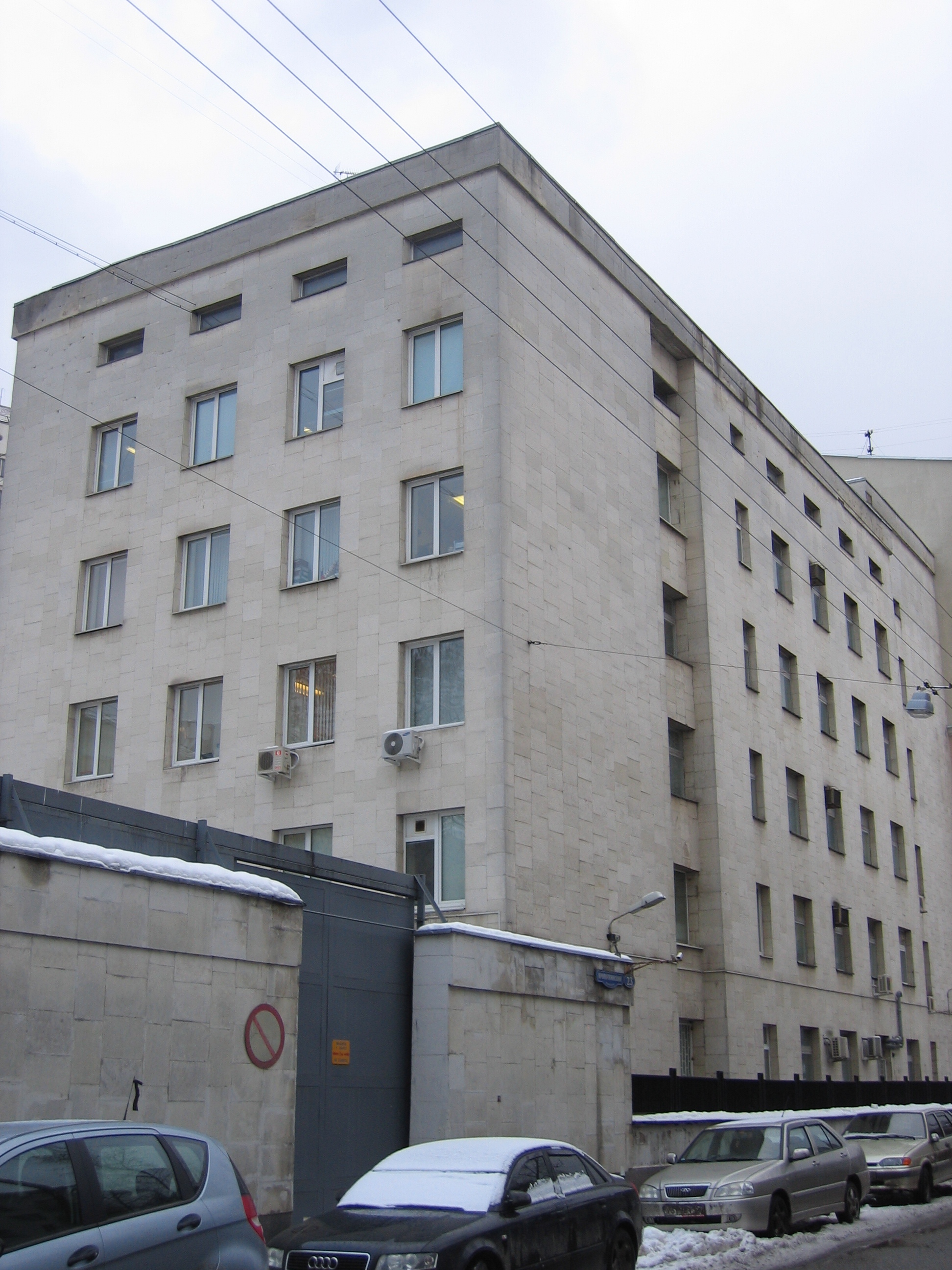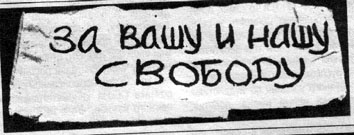|
They Chose Freedom
''They Chose Freedom'' (russian: Они выбирали свободу, Oni vybirali svobodu) is a four-part TV documentary on the history of political dissent in the USSR from the 1950s to the 1990s. It was produced in 2005 by Vladimir V. Kara-Murza. The documentary tells the story of the Soviet dissident movement from its emergence in the late 1950s with the weekly public Mayakovsky Square poetry readings in Moscow. The development of samizdat, opposition demonstrations held in Moscow such as the 1965 Glasnost meeting and 1968 Red Square demonstration, and the harsh repressions unleashed by Soviet authorities against dissenters including forced psychiatric "treatment", prison camps and deportations, are all part of the film's narrative. The third episode deals with events leading to the collapse of Soviet dictatorship and the democratic revolution of August 1991. The final episode is dedicated to the period after 1991; in it former dissidents discuss why the emergence of de ... [...More Info...] [...Related Items...] OR: [Wikipedia] [Google] [Baidu] |
Vladimir V
Vladimir may refer to: Names * Vladimir (name) for the Bulgarian, Croatian, Czech, Macedonian, Romanian, Russian, Serbian, Slovak and Slovenian spellings of a Slavic name * Uladzimir for the Belarusian version of the name * Volodymyr for the Ukrainian version of the name * Włodzimierz (given name) for the Polish version of the name * Valdemar for the Germanic version of the name * Wladimir for an alternative spelling of the name Places * Vladimir, Russia, a city in Russia * Vladimir Oblast, a federal subject of Russia * Vladimir-Suzdal, a medieval principality * Vladimir, Ulcinj, a village in Ulcinj Municipality, Montenegro * Vladimir, Gorj, a commune in Gorj County, Romania * Vladimir, a village in Goiești Commune, Dolj County, Romania * Vladimir (river), a tributary of the Gilort in Gorj County, Romania * Volodymyr (city), a city in Ukraine Religious leaders * Metropolitan Vladimir (other), multiple * Jovan Vladimir (d. 1016), ruler of Doclea and a saint of the S ... [...More Info...] [...Related Items...] OR: [Wikipedia] [Google] [Baidu] |
USSR
The Soviet Union,. officially the Union of Soviet Socialist Republics. (USSR),. was a transcontinental country that spanned much of Eurasia from 1922 to 1991. A flagship communist state, it was nominally a federal union of fifteen national republics; in practice, both its government and its economy were highly centralized until its final years. It was a one-party state governed by the Communist Party of the Soviet Union, with the city of Moscow serving as its capital as well as that of its largest and most populous republic: the Russian SFSR. Other major cities included Leningrad (Russian SFSR), Kiev ( Ukrainian SSR), Minsk ( Byelorussian SSR), Tashkent (Uzbek SSR), Alma-Ata (Kazakh SSR), and Novosibirsk (Russian SFSR). It was the largest country in the world, covering over and spanning eleven time zones. The country's roots lay in the October Revolution of 1917, when the Bolsheviks, under the leadership of Vladimir Lenin, overthrew the Russian Provisional Gove ... [...More Info...] [...Related Items...] OR: [Wikipedia] [Google] [Baidu] |
Freedom House
Freedom House is a non-profit, majority U.S. government funded organization in Washington, D.C., that conducts research and advocacy on democracy, political freedom, and human rights. Freedom House was founded in October 1941, and Wendell Willkie and Eleanor Roosevelt served as its first honorary chairpersons. It describes itself as a "clear voice for democracy and freedom around the world", although some critics have stated that the organization is biased towards U.S. interests as it is government-funded. The organization was 66% funded by grants from the U.S. government in 2006, a number which has increased to 86% in 2016. The organization's annual ''Freedom in the World'' report, which assesses each country's degree of political freedoms and civil liberties, is frequently cited by political scientists, journalists, and policymakers. '' Freedom of the Press'' and ''Freedom on the Net'', [...More Info...] [...Related Items...] OR: [Wikipedia] [Google] [Baidu] |
Columbia University In The City Of New York
Columbia University (also known as Columbia, and officially as Columbia University in the City of New York) is a private research university in New York City. Established in 1754 as King's College on the grounds of Trinity Church in Manhattan, Columbia is the oldest institution of higher education in New York and the fifth-oldest institution of higher learning in the United States. It is one of nine colonial colleges founded prior to the Declaration of Independence. It is a member of the Ivy League. Columbia is ranked among the top universities in the world. Columbia was established by royal charter under George II of Great Britain. It was renamed Columbia College in 1784 following the American Revolution, and in 1787 was placed under a private board of trustees headed by former students Alexander Hamilton and John Jay. In 1896, the campus was moved to its current location in Morningside Heights and renamed Columbia University. Columbia scientists and scholars have pla ... [...More Info...] [...Related Items...] OR: [Wikipedia] [Google] [Baidu] |
Harvard University
Harvard University is a private Ivy League research university in Cambridge, Massachusetts. Founded in 1636 as Harvard College and named for its first benefactor, the Puritan clergyman John Harvard, it is the oldest institution of higher learning in the United States and one of the most prestigious and highly ranked universities in the world. The university is composed of ten academic faculties plus Harvard Radcliffe Institute. The Faculty of Arts and Sciences offers study in a wide range of undergraduate and graduate academic disciplines, and other faculties offer only graduate degrees, including professional degrees. Harvard has three main campuses: the Cambridge campus centered on Harvard Yard; an adjoining campus immediately across Charles River in the Allston neighborhood of Boston; and the medical campus in Boston's Longwood Medical Area. Harvard's endowment is valued at $50.9 billion, making it the wealthiest academic institution in the world. Endowment inco ... [...More Info...] [...Related Items...] OR: [Wikipedia] [Google] [Baidu] |
Ekaterinburg
Yekaterinburg ( ; rus, Екатеринбург, p=jɪkətʲɪrʲɪnˈburk), alternatively romanized as Ekaterinburg and formerly known as Sverdlovsk ( rus, Свердло́вск, , svʲɪrˈdlofsk, 1924–1991), is a city and the administrative centre of Sverdlovsk Oblast and the Ural Federal District, Russia. The city is located on the Iset River between the Volga-Ural region and Siberia, with a population of roughly 1.5 million residents, up to 2.2 million residents in the urban agglomeration. Yekaterinburg is the fourth-largest city in Russia, the largest city in the Ural Federal District, and one of Russia's main cultural and industrial centres. Yekaterinburg has been dubbed the "Third capital of Russia", as it is ranked third by the size of its economy, culture, transportation and tourism. Yekaterinburg was founded on 18 November 1723 and named after the Russian emperor Peter the Great's wife, who after his death became Catherine I, Yekaterina being the Russian form of ... [...More Info...] [...Related Items...] OR: [Wikipedia] [Google] [Baidu] |
Sakharov Center
The Sakharov Center (russian: Са́харовский центр) is a museum and cultural center in Moscow devoted to protection of human rights in Russia and preserving the legacy of the prominent physicist and Nobel Prize winning human rights activist Andrei Sakharov. It was founded by the "Public Commission to Protect the Legacy of Andrei Sakharov", an international non-governmental organization established in 1990 through the efforts of Sakharov's widow Yelena Bonner and other Sakharov's friends and colleagues. History In 1994 the Public Commission opened the Sakharov Archives in the three-room apartment where Andrei Sakharov lived. The archives’ contents were donated by Yelena Bonner, and include files donated by Russia's Federal Counterintelligence Service. In 1996 the Sakharov Commission opened the Sakharov Museum and multi-functional social center for Peace, Progress and Human Rights (renamed in 2012 as the Sakharov Center). The main building of the museum is a two-st ... [...More Info...] [...Related Items...] OR: [Wikipedia] [Google] [Baidu] |
Vladimir Putin
Vladimir Vladimirovich Putin; (born 7 October 1952) is a Russian politician and former intelligence officer who holds the office of president of Russia. Putin has served continuously as president or prime minister since 1999: as prime minister from 1999 to 2000 and from 2008 to 2012, and as president from 2000 to 2008 and since 2012. Putin worked as a KGB foreign intelligence officer for 16 years, rising to the rank of lieutenant colonel before resigning in 1991 to begin a political career in Saint Petersburg. He moved to Moscow in 1996 to join the administration of president Boris Yeltsin. He briefly served as director of the Federal Security Service (FSB) and secretary of the Security Council of Russia, before being appointed as prime minister in August 1999. After the resignation of Yeltsin, Putin became Acting President of Russia and, less than four months later, was elected outright to his first term as president. He was reelected in 2004. As he was constitutionall ... [...More Info...] [...Related Items...] OR: [Wikipedia] [Google] [Baidu] |
Gulag
The Gulag, an acronym for , , "chief administration of the camps". The original name given to the system of camps controlled by the GPU was the Main Administration of Corrective Labor Camps (, )., name=, group= was the government agency in charge of the Soviet network of forced labour camps which were set up by order of Vladimir Lenin, reaching its peak during Joseph Stalin's rule from the 1930s to the early 1950s. English-language speakers also use the word ''gulag'' in reference to each of the forced-labor camps that existed in the Soviet Union, including the camps that existed in the post-Lenin era. The Gulag is recognized as a major instrument of political repression in the Soviet Union. The camps housed a wide range of convicts, from petty criminals to political prisoners, a large number of whom were convicted by simplified procedures, such as NKVD troikas or other instruments of extrajudicial punishment. In 1918–22, the agency was administered by the Cheka, follow ... [...More Info...] [...Related Items...] OR: [Wikipedia] [Google] [Baidu] |
Political Abuse Of Psychiatry In The Soviet Union
There was systematic political abuse of psychiatry in the Soviet Union, based on the interpretation of political opposition or dissent as a psychiatric problem. It was called "psychopathological mechanisms" of dissent. During the leadership of General Secretary Leonid Brezhnev, psychiatry was used to disable and remove from society political opponents ("dissidents") who openly expressed beliefs that contradicted the official dogma. The term "philosophical intoxication", for instance, was widely applied to the mental disorders diagnosed when people disagreed with the country's Communist leaders and, by referring to the writings of the Founding Fathers of Marxism–Leninism—Karl Marx, Friedrich Engels, and Vladimir Lenin—made them the target of criticism. Article 58-10 of the Stalin-era Criminal Code, "Anti-Soviet agitation", was to a considerable degree preserved in the new 1958 RSFSR Criminal Code as Article 70 "Anti-Soviet agitation and propaganda". In 1967, a weaker l ... [...More Info...] [...Related Items...] OR: [Wikipedia] [Google] [Baidu] |
1968 Red Square Demonstration
The 1968 Red Square demonstration (russian: Демонстра́ция 25 а́вгуста 1968 го́да) took place in Moscow on 25 August 1968. It was a protest by eight demonstrators against the Soviet invasion of Czechoslovakia (1968), invasion of Czechoslovakia on the night of 20–21 August 1968 by the Soviet Union and its Warsaw Pact allies, crushing the Prague spring, Prague Spring, the challenge to centralised planning and censorship by Communist Party of Czechoslovakia, communist leader Alexander Dubček. The protest took place at the Lobnoye Mesto (Place of Proclamation) on Red Square next to the Kremlin, to avoid any accusation of a violation of public order. It was a non-violent, sit-down demonstration. However, all but one of the protestors was quickly and roughly arrested by police and plainclothes KGB men. The protest, 25 August The protest began at noon as eight protesters (Larisa Bogoraz, Konstantin Babitsky, Vadim Delaunay, Vladimir Dremliuga, Pavel Litv ... [...More Info...] [...Related Items...] OR: [Wikipedia] [Google] [Baidu] |




